Postpartum pain syndromes:an introduction of postpartum generalized pain, lumbago, cold hernia, distention and fullness of hypochondria, concretions and gatherings, and other related pain syndromes.
-
 ✵Gynecology of TCM is a branch to study the physiological and pathological characteristics of women and to prevent and treat syndromes specific to women. Gynecology of TCM research scope including irregular menstruation, amenia, metrorrhagia, infertility, postpartum syndromes, breast syndromes, and miscellaneous syndromes, etc.
✵Gynecology of TCM is a branch to study the physiological and pathological characteristics of women and to prevent and treat syndromes specific to women. Gynecology of TCM research scope including irregular menstruation, amenia, metrorrhagia, infertility, postpartum syndromes, breast syndromes, and miscellaneous syndromes, etc.
- Postpartum pain syndromes.
-
✵The postpartum pain syndromes are also known as pain syndromes of women after childbirth, a series of pain syndromes of women following childbirth. They are also known as pain syndromes after childbirth.
✧ In the TCM system, the pathogenic reasons for the postpartum pain syndromes normally are Qi weakness, blood stagnant and stasis in the channels and muscles, deficiency in five Zang-viscera, a disorder of ascending and descending, deficiency of stomach Qi, phlegm stagnant, consumption and strain affection, and affection of exogenous pathogens wind or cold, etc. Common related symptoms observed are whole-body pain, pain in finger joints, headache, pain in bones and joints of the whole body and limbs, traveling pain, etc. The wind-stroke related syndromes are understood due to different reasons and also specific reasons, with different symptoms.
✵The women pain syndromes after childbirth and pain-related syndromes are introduced: postpartum generalized pain, generalized pain, postpartum cephalea or headache, postpartum neck pain and stiffness, postpartum arm pain, postpartum lumbago(low back pain), pain in low back and knees, postpartum leg pain, postpartum heartache, postpartum stomachache, postpartum distention and fullness of hypochondria, postpartum pain of hypochondria, postpartum abdominal pain, postpartum cold hernia, postpartum blood stasis in the abdomen, postpartum pain in the lower abdomen, postpartum concretions and gatherings, postpartum pain of blood clots, postpartum hematic abdominal mass, pains and itching in genital regions, etc.
- Postpartum generalized pain.
-
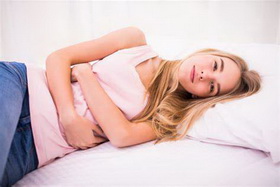
✵The postpartum generalized pain is a generalized pain following childbirth due to various pathogenic reasons.
✧ In the TCM system, the pathogenic reasons for the postpartum generalized pain normally are opening of channels after childbirth, blood flows around, in case of Qi weakness blood stagnant and stasis in the channels and muscles, not dissipated in the long period will lead to uncomfortable joints and contracture urgency of muscle and channels. Thus, the body could not move around, the inflexibility of hands and feet, body heat, and headache. If it is treated as a cold-induced disease, she will perspire and counterflow cold of limbs, it will develop to other syndromes.
✵Ancient herbalists who hold a syndrome differentiation viewpoint with similar explain of pathogenic reasons, and the relevant representative work are introduced and quoted:"A woman suffers from whole-body pain after childbirth, mainly due to the opening of channels, blood collaterals flowing, and dissipating. Qi weakness and blood stagnant in collaterals, not dissipating in a long period, then contracting and spasm in tendons and muscles, not smooth in joints movement, as a result back and waist has difficulty in turning around, hands and feet have difficulty to move or fever with a headache, if mistreated as cold-induced disease, relieve the exterior and sweating, as a result, reverse cold of hands and feet, develops to various syndromes." [04].
"Case after childbirth, a woman suffers from whole-body pain, pain in finger joints, headache, and not sweating." [04].
"A woman suffers from pain in bones and joints of the whole body and limbs after childbirth, what is it? It is the condition that during childbirth, joints opening, deficiency of both Qi and blood, these are reasons of consumption or strain, sit or laying constrained, affected by the wind outside..." [05].
"A woman suffers from pain whole body after childbirth, all due to joints of the whole body opening, flowing and scattering of blood and collaterals, wind and cold invading..." [07].
"A woman suffers from generalized pain whole body after childbirth, due to movement of Qi and blood, a disorder of ascending and descending, stagnant and stasis in joints, contracture of tendons and collaterals, or spasm of hands and feet, could not stretch out or bend, so traveling pain whole body...or residue blood not passing down, flow to other parts, then pain in joints..." [08].
"A woman suffers from generalized pain whole body after childbirth, due to joints opening during childbirth, Qi deficiency, blood condensed, stagnant and stasis in joints, contracture of tendons and collaterals, waist and back could not turn around, hands and feet could not stretch out or bend and pains, ..." [09].
"Generalized pain after childbirth: in case lose excessive volume of blood(during childbirth), ... In case wind and cold pathogens invading, ... In case purple and red on face and lips, is the syndrome of blood stasis, ..." [10].
✵The postpartum generalized pain common types are known including:
✧ Postpartum generalized pain, waist and back could not move around, the inflexibility of hands and feet, body heat, and headache.
✧ Postpartum generalized pain, deficiency of blood and Qi, body pain, headache, pain in waist and back, spontaneous sweating and fever.
✧ "Case postpartum lochia discharge not smoothly, blood counter flow upward to the heart, stabbing pain, blood fainting..." [02].
- Generalized pain.
-
✵The generalized pain of women is a generalized pain due to various pathogenic reasons, suffers not only after childbirth.
✧ In the TCM system, the pathogenic reasons for the generalized pain of women normally are wind affection, phlegm stagnant, consumption, and strain affection, sometimes the self-described symptoms are whole-body pain or pain in the bones of the whole body, etc.
✵Ancient herbalists who hold a syndrome differentiation viewpoint with similar explain of pathogenic reasons, and the relevant representative work are introduced and quoted:"A woman suffers from pain in bones of the whole body, affected by wind, or phlegm, or consumption and strain, what are they? In case pain of the whole body, noise in the heart(vexation, worry), is the condition of phlegm stagnancy; In case pain of the whole body and edema or distention in hands and feet, is the condition of dampness and heat affection; In case pain of the whole body, internal heat, dry mouth(thirst, dryness in the mouth), yellow complexion(looks yellow on face), is the condition of consumption and strain." [05].
- Postpartum cephalea or headache.
-

✵The postpartum cephalea or headache is the headache occurring following childbirth, mainly due to blood deficiency, its symptoms are case is mild in the day time and severe at night, suddenly attack then suddenly relieved.
✧In the TCM system, the pathogenic reasons for postpartum headache normally are deficiency in five Zang-viscera, weakness, and deficiency of stomach Qi, poor appetite and low food intake, weak nutrient Qi(Ying), lead to deficiency heat, Yang Qi not guarding, and flow up to the head, Yang excess and Yin deficiency, lead to pain in the head or headache. Other syndromes are known as headaches due to residue blood after childbirth.
✵Ancient herbalists who hold a syndrome differentiation viewpoint with similar explain of pathogenic reasons, and the relevant representative work are introduced and quoted:"A woman suffers from headaches mostly due to blood deficiency, its symptoms are mild in the day time and severe at night, suddenly attack then suddenly relieved. Although pain at the top of the head, but no pains in the brow ridge..." [08].Different types are introduced:
⑴.A woman suffers from headache due to blood deficiency after childbirth, mild in the day time and severe at night, suddenly attack then suddenly gone, pain at the top but not pain in the brow ridge;
⑵.A woman suffers from the headache of the wind-cold pathogen after childbirth, no break, also pain in brow ridge;
⑶.A woman suffers from the headache of the wind-cold pathogen after childbirth, no break, also a pain in brow ridge, spasm of hands and feet, headache chewing teeth, and fainting, it is an urgent case;
⑷.A woman suffers from headache after childbirth, vomiting and no appetite(do not take food), is the condition of blood deficiency and deficient-fire burning upward; or vomit stopped and still headache;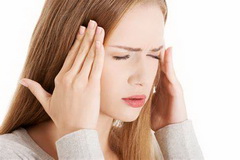 "Headache after childbirth:...a woman loses excessive blood after childbirth, deficiency of Yin, Yang lost guarding, the head is the confluence of all yang-channels, flow upward to the head, as a result, pain in the head...
"Headache after childbirth:...a woman loses excessive blood after childbirth, deficiency of Yin, Yang lost guarding, the head is the confluence of all yang-channels, flow upward to the head, as a result, pain in the head...
And, there are cases residue blood retained and stasis, uterus, the sits of Jue Yin, it channel flow upward to the top of the head, pain in the top of the head..." [09]."Headache after childbirth: in case yellow-white complexion(looks yellow and white on face), no exterior and interior symptoms, is the syndrome of losing the excessive volume of blood after childbirth, ... In case abdominal pain is observed first, is the case that blood stasis gradually attack upward, ..." [10].
- Postpartum neck pain and stiffness.
-
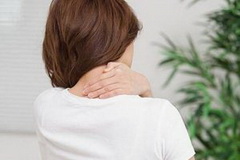
✵The postpartum neck pain and stiffness is a syndrome pain and stiffness in the neck occurring following childbirth, it is also known as postpartum neck pain, or pain and stiffness of neck after childbirth, due to various pathogenic reasons.
✧ In the TCM system, the pathogenic reasons for pain and stiffness of neck after childbirth normally are wind and cold pathogen, excessive liver fire, blood deficiency of the liver, common symptoms are fever and aversion to cold, pain and stiffness of the neck, bending of waist and back, lockjaw, pulse is sinking slow and string-like fine.
✵Ancient herbalists who hold a syndrome differentiation viewpoint with similar explain of pathogenic reasons, and the relevant representative work are introduced and quoted:"A woman suffers from pain and stiffness of neck: In the condition affected by wind-cold dampness pathogen, then fever and aversion to cold, pain and stiffness of the neck, bending of the waist and back, lockjaw, the pulse is sinking slow string-like and fine. After childbirth, a woman normally suffers from blood deficiency and perspiration mostly suffers from this syndrome too... In general, the condition liver fire excessive, then liver blood turn deficiency and dryness in tendons and muscles, stiffness and pains in the neck, or bending of the waist and back, or spasm of four limbs, or form concretion masses at the neck region." [06].
In general, there are different pathogenic reasons for the pain and stiffness of the neck and back, including Qi-stagnancy of hand Tai Yang, the excess of liver wood, deficiency of essence and blood, wind and heat affect the liver, anger motivates liver fire, blood deficiency of the liver, the kidney could not support the liver, Qi stagnancy in the urinary bladder, etc.
- Postpartum arm pain.
-

✵The postpartum arm pain is a syndrome pains in arms occurring following childbirth, it is also known as postpartum brachialgia, or arm pain after childbirth, due to various pathogenic reasons.
✧ In the TCM system, the pathogenic reasons for arm pain or arm pain after childbirth normally are the weakness of the liver Qi, wind and cold pathogen affection, deficiency of the middle Qi, dryness of blood and wind-heat, excess head of spleen and stomach, liver fire due to anger, etc.
✵Ancient herbalists who hold a syndrome differentiation viewpoint with similar explain of pathogenic reasons, and the relevant representative work are introduced and quoted:"A woman suffers from pain in arms, or spasm in tendon and muscles, aggravated in coldness, due to deficiency and weakness of the liver Qi, wind and cold pathogen affection...; In case pain in arms and could not lift, or pain at the uncertain region, due to spleen deficiency and affection from pathogens, phlegm accumulated in the middle, pulse sinking and fine...; or liver blood deficiency, ...or middle Qi deficiency, ...or deficiency of both Qi and blood, ...or wind-heat and blood dryness, ...or deficiency cold of spleen and kidney, ...or excess heat of spleen and stomach, ...or liver fire from anger, ...or dizziness and heat(or fever) in the late afternoon, ...or heat(or fever) in the late afternoon, irregular menstruation..., or poor appetite and lassitude, tiredness and night sweats..." [06].
- Postpartum lumbago(postpartum low back pain).
-
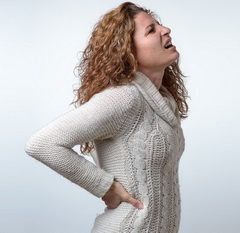
✵The postpartum lumbago(low back pain) is lumbago or low back pain occurring following childbirth, due to various pathogenic reasons.
✧ In the TCM system, the pathogenic reasons for postpartum lumbago(low back pain) normally are consumption hurt of the kidney(the kidney close and bind to the uterus), hurt the collaterals of the uterus; deficiency is not relieved and wind-cold pathogen affect again, cold pathogen attack the waist region, lead to lumbago or low back pain. In cases cold pathogen spread to the back, the pain will not be relieved in a long period.
✵Ancient herbalists who hold a syndrome differentiation viewpoint with similar explain of pathogenic reasons, and the relevant representative work are introduced and quoted:"Low back pain after childbirth, due to the kidney viscus hold closely. The waist or low back is the Fu of the kidney viscus, labor strain hurt the kidney Qi, and hurt the collaterals of the uterus; or deficiency not recovered, and affected by wind and cold pathogen, these two pathogens all could affect the low back region." [04].
"Case after childbirth, a woman suffers from low back pain from wind blow or cold affection, pain in the low back, and could not turn around.
Case after childbirth, deficiency of Qi and blood, pain in the low back and kidney deficiency." [04]."A woman often suffers from pain in the low back, what is it? The pathogenic reasons wind, cold, dampness, stasis all lead to pain in the low back, which is not only due to deficiency and should not be treated only as a deficiency syndrome." [05].
"A woman suffers from pain in the low back, due to deficiency of the kidney, and affected by six exogenous pathogens, hurt by seven endogenous emotions, all could lead to pain in low back...; In case physical thin and emaciated, the darkness in complexion, softness of legs and feet, could not move freely, is due to lost of wills; In case pain in the abdomen and distention in hypochondrias, blurred vision, urogenital region pains, white mucous discharge(leukorrhea), is due to depression and anger; In case numbness of muscles, diet and food could not be transformed, distension and fullness in the stomach and intestines, heavy and dropping of the waist, is due to worry. All due to endogenous pathogens. In case of cold in the waist and pains, the heaviness of the body and not thirst, urine uninhibited, appetite is as normal, sweating due to strain and consumption, impairment of the waist and pain in hypochondria, or discharge blood stasis, or essence exhaustion due to sexual strains, all due to endogenous and exogenous pathogens..." [06].
"A woman suffers from strain hurt, the kidney is affected by wind, pain in the low back(waist) and could not turn around...; In case Qi deficiency of long period, kidney weakness and pain in the low back..." [08].
"Lumbago pain after childbirth: a woman...lose much blood and the uterine vessels(vessels of the uterus) are deficient, and then kidney Qi is deficient. ...as a result, pain in the low back or lumbago... Its symptoms are hidden pains." [09].Different types are introduced:
⑴.A woman suffers from lumbago pain or low back pain after childbirth, lose much blood and kidney Qi is deficient, hidden pains in the low back or lumbago;
⑵...., residue blood flow into the kidney channel, blocking the belt vessel, pain in the low back or lumbago. Its symptoms distention pain as stabbing, sudden attack sudden stopped, could not be touched by hand;
⑶...., hurt from stand up or sit down, the kidney Qi and belt vessel are hurt, also lead to pain in the low back or lumbago;"Low back pain after childbirth: in case pain in the low back and injecting to the two thighs, is the syndrome wind and cold invading the interior during childbirth, blood stagnant in the three Yin meridians;... In case loss excessive volume of blood(during childbirth), the three Yin meridians are insufficient and hurt, ..." [10].
✵The postpartum lumbago(postpartum low back pain) common types are known including:
✧⑴.A woman suffers from lumbago after childbirth(postpartum low back pain), affected by wind and cold pathogen, low back pain and unable to move around;
✧⑵...., deficiency cold, blood deficiency and flow into the waist and legs, low back pain and could not move around;
✧⑶...., residue flow is incessant, blood flow into the waist and pain in the low back and legs feet, fullness in the chest and dyspnea(shortness of breath), hypochondriac pain.
✧⑷...., wind-stroke, pain and stiffness in the waist and back, dysphoria with smothery sensation, thirst, heavy in body and head, this is the case of postpartum lumbago due to wind and cold pathogen.
✧⑸...., lumbago(low back pain) in three days after childbirth, residue blood in the abdomen, pain in hands and feet, no appetite(no food intake).
✧⑹...., lochia, suddenly less amount lochia gradually, stopped, heavy and pain in the waist, spread downward to thighs, pain as cutting by knife, stabbing pain in the bone. This is the case of postpartum lumbago(low back pain after childbirth) due to blood stagnant in meridian and channels.
- Pain in low back and knees.
-
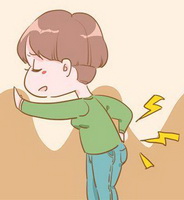
✵Pains in the low back and knees are pains in low back and knees occurring during the menstrual period or following childbirth, due to various pathogenic reasons.
✧ In the TCM system, the pathogenic reasons for postpartum pain in the low back and knees normally are exogenous pathogenic wind, cold, dampness.
✵Ancient herbalists who hold a syndrome differentiation viewpoint with similar explain of pathogenic reasons, and the relevant representative work are introduced and quoted:"A woman suffers from pain in the low back region and knees, pain location is not fixed, as bite by a tiger, unbearable, what is it? This is the case a woman suffers during the menstruation period or after childbirth, she was affected by exogenous pathogenic wind, cold, and dampness pathogens, stagnant in three Yin meridians." [05].
- Postpartum leg pain.
-

✵The postpartum leg pain is the leg pain or pain in the legs occurring following childbirth, due to various pathogenic reasons majorly spleen Yin deficiency, other symptoms are could not stand for a long time, no appetite or do not like to take food, etc.
✵Ancient herbalists who hold a syndrome differentiation viewpoint with similar explain of pathogenic reasons, and the relevant representative work are introduced and quoted:"A woman suffers from leg pain after childbirth, could not stand for long, and could not take food or drink, is the syndrome of spleen Yin insufficiency...; In severe cases, pain radiating to the waist and belly button, pain in both legs and hip, is also insufficiency of the kidney Qi..." [08].Different types are introduced:
⑴.A woman suffers from leg pain, could not stand for long, and do not take food or drink(poor appetite), is the case of spleen Yin insufficiency;
⑵.A woman suffers from leg pain, could not stand for long, and poor appetite, in severe case pain radiating to the waist and belly button, pain in legs and hips, is the case of spleen Yin deficiency and kidney Qi insufficiency;
- Postpartum heartache.
-

✵The postpartum heartache is the heartache or pain in the heart occurring following childbirth, due to various pathogenic reasons seven emotions, Qi and blood, residue blood accumulation, etc.
✵Ancient herbalists who hold a syndrome differentiation viewpoint with similar explain of pathogenic reasons, and the relevant representative work are introduced and quoted:"A woman suffers from seven emotions after childbirth, Qi and blood combined and pain in the heart..., or the case residue blood accumulated, Qi flow up and affect the heart..." [08].Different types are introduced:
⑴.A woman suffers from heartache after childbirth, Qi and blood combined and pain in the heart;
⑵.A woman suffers from heartache after childbirth, residue blood accumulated, Qi flow up and affect the heart;"A woman suffers from heartache, what is it? ... A woman suffers from hidden chronic cold pathogens, for deficiency and cold combat on blood after childbirth, blood condensed and not flows smoothly, flow upward to the collaterals of the heart viscus, as a result, pain in the heart...; If mistakenly diagnosed as residue blood and use attacking method, then result will lead to extreme deficiency, cold turn excessive, ...develops to real heart pain, ...and is incurable." [09].
- Postpartum stomachache.
-

✵The postpartum stomachache is a case of stomachache or gastralgia occurring following childbirth, due to various pathogenic reasons.
✧ In the TCM system, the pathogenic reasons for the postpartum stomachache normally are coldness pathogen affection, affected by taking cold food or cold drink, etc. Because the gastral cavity is located below the heart and approaches the heart, so sometimes people self-declare "heart pain", but actually it is not a real heart pain syndrome.
✵Ancient herbalists who hold a syndrome differentiation viewpoint with similar explain of pathogenic reasons, and the relevant representative work are introduced and quoted:"The stomachache or gastric cavity pain after childbirth, for the gastric cavity, is located below the heart viscus, affected by cold pathogen and take cold diet or drink cold water and pains. Because the pain approaches the heart, so commonly it is called 'heart pain'...; but real heart pain will observe symptoms cyanotic and black, will die at night if it attacks in the morning, or will die in the next morning if it attacks at night. The cold pathogen and cold diet affect upward then she suffers from stomachache, affects downward then she suffers from pain in the abdomen." [04].
"A woman suffers from sudden stomachache and unbearable after childbirth, what is it? It is the condition that stomach Qi is weak and deficient, insufficiency of blood in the heart meridian, not smooth in the two viscera, also affected by seven emotions, as a result, lead to unbalance of Qi, pain and unbearable..." [05].
"A woman suffers from Yang deficiency and weak, cold generated from the interior, or exogenous cold pathogen invading externally, as a result, pain in the heart and abdomen, vomit and no appetite, cold in limbs(reverse cold in hands and arms, feet and legs)...., or residue lochia not discharged(lochiorrhagia), pain in the heart and abdomen..." [08].
"Heartache after childbirth: It is epigastralgia(stomachache). The heart is a master viscus, blood deficiency leads to palpitation, frightened, severe palpitation syndromes, how it pains?..." [09].
"Stomachache and Heartache after childbirth: In case reverse cold of four limbs(reverse cold in hands, arms, feet, legs), cyanotic and white in nails of hands and feet, is the syndrome wind and cold invading the interior, Qi and blood condensed and stasis...; In case pain around the ZhongWan(the middle part of the gastric cavity), sick of food and vomit, is the syndrome of food retention...; In case constipated and pain in urination, thirst and want to drink cold (water), is the syndrome of excess heat, ..." [10].
- Postpartum distention and fullness of hypochondria, Postpartum pain of hypochondria.
-
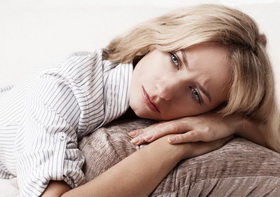
✵The postpartum distention and fullness of hypochondria is a case of distention and fullness of hypochondria occurring following childbirth, due to various pathogenic reasons.
✧ In the TCM system, the pathogenic reasons for the distention and fullness of hypochondria after childbirth normally are stagnant water in the urinary bladder, persistent flow of lochia(lochiorrhea) after childbirth, water accumulation, and Qi combat, accumulated in the urinary bladder, leading to distention and fullness of hypochondria. Affected by Qi and water combat, thus lead to pains.
✵The postpartum distention and fullness of hypochondria common types are known including:
✧⑴.A woman suffers from distention and fullness of hypochondria after childbirth, deficiency of blood and Qi, distending pain in the hypochondrium.
✧⑵...., retention of the lochia(lochiorrhea), Qi and blood are stagnant and form a lump in the abdomen, distention pain and no appetite(could not intake food).
✧⑶...., abdominal pain after childbirth, fullness and distention in hypochondria and abdomen.
✧⑷...., depression and vexation, fullness and distention in hypochondria and abdomen, and pains.
✧⑸...., abdominal pain after childbirth, Qi distention, oppression in the hypochondria, no appetite(no food intake), mild diarrhea, etc.
✵The postpartum pain of hypochondria is a case of pain on the left side or right side hypochondria occurring following childbirth, due to various pathogenic reasons. In the TCM system, the pathogenic reasons for the postpartum pain of hypochondria normally are blood or phlegm.
✵Ancient herbalists who hold a syndrome differentiation viewpoint with similar explain of pathogenic reasons, and the relevant representative work are introduced and quoted:"A woman suffers from pains on the left side or right side hypochondria after childbirth, what is it? It is due to blood if pain on the left side, or due to phlegm if pain on the right side." [05].
"Distension and pain in the hypochondrias: a woman suffers from pain in the hypochondria, due to deficiency and weakness of Zang and Fu viscera, a disorder of Qi and blood, wind and cold invading the collaterals of the uterus, combat with each other, and congestion." [06].Different types of pain in the lower abdomen are introduced:
⑴.A woman suffers from pain in the hypochondrias, bitter in mouth and dry tongue, alternative chills and fever, vomit, fullness in limbs(hands and arms, feet and legs), difficulty in urination or defecation, pain in the abdomen, is the condition of liver wood disorder;
⑵...., in the condition sudden anger hurt the blood;
⑶...., in the condition Qi deficiency;
⑷...., in the condition Qi is hurt from long term anger;
⑸...., in the condition deficiency of Qi and blood;
⑹...., in the condition pain in the abdomen during menstruation, alternative chills and fever, fever at late afternoon, or irregular menstruation, fever with cough and phlegm, poor appetite and prefer to sleep, body pain;
⑺...., in the condition distention of the hypochondrias, thirst and spit phlegm, or dripping urine, or night sweat and blood urine;
⑻...., in the condition dim eyesight(or blurred vision), or spasm, or cyanotic complexion(looks cyanotic), pain in the lower abdomen, or disorder in urination;"A woman suffers from pains in the hypochondria region, is due to residue blood..." [08]. The conditions are different in left hypochondria or right hypochondria.
"Pain in hypochondria after childbirth:...it is due to residue blood flow into the liver meridian, ...as a result, pain in the hypochondria. The syndromes have excess or deficiency types, should be treated differently, should not be mistakenly treated." [09].Different types are introduced:
⑴.A woman suffers from pain in hypochondria after childbirth, residue blood flow into the liver meridian, distention in the left hypochondria, could not bear massage with hands, blood stasis inside...
⑵...., prefer to be massaged, the Qi inside move between ribs, symptoms are similar to Ben Tun(renal mass), due to losing much blood, deficiency of the liver viscus.
⑶...., pain in the left hypochondria side.
⑷...., pain in the right hypochondria side."Pain in the hypochondria after childbirth: in case pain in the left hypochondria, mostly belongs to liver blood stasis, ... In case pain in the right hypochondria, mostly due to liver Qi stagnant, ... In case pain due to lose much blood, ..." [10].
- Postpartum abdominal pain.
-
✵The postpartum abdominal pain is a pain in the abdomen or around the abdomen following childbirth due to various pathogenic reasons.
✧ In the TCM system, the pathogenic reasons for the postpartum abdominal pain normally are deficiency, blood stasis, etc.
✵Ancient herbalists who hold a syndrome differentiation viewpoint with similar explain of pathogenic reasons, and the relevant representative work are introduced and quoted:"Case abdominal pain after childbirth, should differentiate blood stasis or deficiency, in the case pressed and pain turn severe, is the condition of abdominal pain due to blood stasis; in the case pressed and not pains, is the condition of abdominal pain due to blood deficiency." [02].
"Case abdominal pain after childbirth, aversion to cold and fever, is the condition of extravasated blood..." [02].
"Case excessive bleeding after childbirth, pains, is the condition of blood deficiency..." [02].
"Case hematochezia not thoroughly(lochia discharge) after childbirth, pains, is the condition of blood stasis..." [02].
"Case pain in the abdomen(abdominal pain) after childbirth of the first child, or general fever(body heat) and aversion to cold, pain turns severe if pressed, is the condition of blood stasis..." [02].
✧"Over 10 days after childbirth, general fever and aversion to cold, trembling, vomit and sweating, abdominal pain, press with hand and not pains, is the condition of great deficiency or asthenia, other symptoms observed might include diarrhea, great fever, excessive perspiration, great trembling, is the condition of severe asthenia and cold syndrome." [02].
"Case postpartum indigestion(dyspepsia), pain in the abdomen and general fever, right-hand guan pulse is sinking slippery and powerful..." [02]."Postpartum fever with pain in the abdomen, pain turns severe when pressed, not sick of food, not swallow sour acid, is the condition of blood stasis stagnancy..." [03].
"Postpartum fever and cephalea, or with abdominal pain, but no pains when pressed, is the condition of blood deficiency..." [03]."A woman suffers from abdominal pain after childbirth, diarrhea is unstoppable, tiredness of body, not tasty in diet and drink, depression for long days, night sweating as rain in sleep at night, and dare not to sleep at night, thin and emaciated in body, exhaustion of spirit and mind. It is a case of Qi and blood deficiency with heat..." [03]."A woman suffers from blood not circulate smoothly after childbirth, pain in the abdomen, what is it? It is a case of blood stasis. Since the day the child was born, should support the woman sit a while, and let the blood stagnant in the abdomen flow down, if let her just lay on the bed that time, in most cases it will lead to sick and pain in the abdomen." [05].
"A woman suffers from lochiorrhagia, residue blood is stagnant and stasis and pains is also a common syndrome. But it is different from pain due to deficiency, it develops from mild to severe, or difficulty in urination or defecation, or hard and mass in the lower abdomen and distention, in severe pain state could not bear massage with hands, or pains from lower to upper to the stomach and heart, or lockjaw in severe pain...; In case the mother suffers constitutional deficiency and blood insufficiency, also lose not much blood during childbirth, is not the case of blood stasis..." [08].
✧The pathogenic reasons for the postpartum abdominal pain could also be attributed to: diet reasons, hurt of the middle Qi, etc.
✵Ancient herbalists who hold a syndrome differentiation viewpoint with similar explain of pathogenic reasons, and the relevant representative work are introduced and quoted:"Case fullness in the chest and surfeited to the bursting point, or sick to food and swallow acid liquid(acid regurgitation), or pain in the abdomen and unbearable if pressed with hand, is the condition due to diet and drink..." [03].
"Case indigestion eliminated and still pains, or not pains when pressed, or with cephalea(headache), dysphoria with smothery sensation and thirst, aversion to cold and want to vomit, is the condition of middle Qi is hurt..." [03]."a woman suffers from abdominal pain and fever after childbirth, cunkou pulse is big, identified as diet stagnant and stasis, the patient did not believe it, then she used method to broke blood stasis and tonics for deficiency, on the contrary, observed symptoms alternating chills and fever with cephalea(headache), vomit and spit out saliva and foams, then she used recipes to reduce phlegm and eliminate fire to regulate Qi, result counter cold in limbs, diarrhea with dropping, then she starts to believe it. Asked me: what is the syndrome? Told her: this is a deteriorated case of spleen stomach deficiency..." [03].
✧The pathogenic reasons for the postpartum abdominal pain could also be attributed to: cold pathogen affection, cold diet, and a cold drink, blood clots, residue blood, etc.
✵Ancient herbalists who hold a syndrome differentiation viewpoint with similar explain of pathogenic reasons, and the relevant representative work are introduced and quoted:"The cold pathogen and cold diet affect upward then she suffers from stomachache, affects downward then she suffers from pain in the abdomen." [04].
"Case after childbirth, (a woman is) affected by coldness pathogen, or take cold diet and drink cold water, pain in the abdomen, there is lochia blood clots.
Case after childbirth, (a woman is) affected by coldness pathogen, or take cold diet and drink cold water, pain in the abdomen, there is no lochia blood clots observed. Get hurt from wheat or grain food diet, or get hurt from a meat diet." [04]."Abdominal pain after childbirth: a woman's blood...is lochia during childbirth, lochia did not come then sick, after childbirth, a woman mostly suffers from middle Qi deficiency, blood not circulates well, condensed and stasis, menses stopped and not comes, or comes but not stop, residue blood flows into the abdomen then pains in the abdomen, sudden pains and suddenly stopped, it pains similar to a stabbing, unbearable for hands massage...
Or blood deficiency after childbirth, (a woman is) affected by wind and cold pathogen externally, hurt from cold things(cold diet or drink) internally, as a result, pain in the abdomen, relieved a while when get massaged, or relieved when getting a massage by hot stuff..." [09]."Abdominal pain after childbirth: in case of residue lochia not passing down completely, retained stasis and lead to pain, surely pains and distention(of the abdomen), unbearable when it is massaged with hands, or also hard and distention pain in the lower abdomen, or flow upward from the lower to the heart and chest..." [10].
- Postpartum cold hernia.
-

✵The postpartum cold hernia is a case of cold hernia occurring following childbirth, due to various pathogenic reasons.
✧ In the TCM system, the pathogenic reasons for the postpartum cold hernia normally are cold pathogen affection from breathing cold air, visiting blood in case of deficiency, and hurt from strain or consumption, etc.
✵Ancient herbalists who hold a syndrome differentiation viewpoint with similar explain of pathogenic reasons, and the relevant representative work are introduced and quoted:"Shan Jia(hernia): a woman suffers from Shan Jia(hernia), due to disorder of diet and drink, Qi and blood are hurt from strain or consumption, or menstruation and childbirth, affection from wind and cold... In the condition menstruation stopped, there is a mass in the lower abdomen after menstruation, or move sometimes, protruding of the external genitalia, hemorrhoid at the anus, is the Shan of woman, but for woman, it is traditionally known as Jia instead of Shan..." [06].Common different types are introduced:
⑴.A woman suffers from Jia(hernia), distension and swelling in the lower abdomen, leukorrhea passes with urine regularly, is the condition due to liver damp invasion of the lower energizer;
⑵.A woman suffers from Jia(hernia), distension and pain in the lower abdomen, urine is inhibited, or pain in the chest and breast, or pain in the hypochondria and ribs and reverse flow of Qi, is the condition due to liver fire and blood from the spleen Qi depression;
⑶.A woman suffers from Jia(hernia), distension and fullness in the lower abdomen, urine is inhibited, internal heat, lassitude, and lazy to take food(a reduced appetite or no appetite).
⑷.A woman suffers from Jia(hernia), intercourse during the period there are exogenous pathogens(wind, cold, summer heat, dampness, dryness, and fire), then dragging pain in the lower abdomen, chest and hypochondrias, waist(low back) and back, irregular menstruation, distention in genital regions, dripping urine, complexion yellow black(looks yellow and black on face), then suffers from Jia(hernia)."A woman suffers from wind and cold pathogens invading from the uterus, entering the lower abdomen, or not care in sitting or sleeping, the wind and cold pathogen invading by chances, it is a syndrome of cold hernia, but not distention..." [09].
✵The postpartum cold hernia common types are known including:
✧⑴.A woman suffers from cold hernia after childbirth, extreme pain in the belly button and lower abdomen, breath cold air.
✧⑵...., consumption and insufficiency, or colic pain in the abdomen after childbirth.
✧⑶...., interior deficiency, the cold pathogen enters into the abdomen, colic pain in the abdomen, white or red dysentery, wild talk as seeing a ghost.
✧⑷...., cutting pain in the heart to abdomen, no appetite(could not intake food), lack of Qi(lack of energy), alternating fever and chills suddenly.
- Postpartum blood stasis in abdomen.
-

✵The postpartum blood stasis in the abdomen is a syndrome blood stasis accumulated in the abdomen occurring following childbirth, due to various pathogenic reasons.
✧ In the TCM system, the pathogenic reasons for the Postpartum blood stasis in the abdomen normally are accumulations of menses blood from the stoppage, or residue blood after childbirth not discharged, or blood stagnancy due to wind and cold affection, gradually obstructed and develops to hernia or mass.
✵Ancient herbalists who hold a syndrome differentiation viewpoint with similar explain of pathogenic reasons, and the relevant representative work are introduced and quoted:"A woman suffers from blood stasis in the abdomen, mainly due to accumulated blood from menstruation, or residue blood after childbirth not discharged, or blood stagnancy due to wind and cold affection, gradually obstructed and develops to hernia or abdominal mass." [06].Common different types are introduced:
⑴.A woman suffers from blood stasis in the abdomen, due to the spleen is hurt from depression;
⑵...., due to the liver is hurt from hate and anger;
⑶...., due to lochia after childbirth;
⑷...., due to hurt and deficiency of the liver and spleen;
⑸...., due to deficiency and weakness of the stomach Qi;
⑹...., physical and body is similar to the normal health condition, is the condition of pathogen Qi and primordial Qi are both excessive;
⑺...., pains and lassitude, tiredness in limbs(tiredness in hands and feet, arms and legs), reduced appetite(poor appetite, take a little food), is the condition spleen and stomach is hurt;
⑻...., pains and prefers to massage the abdomen with hands, lassitude and tiredness, reduced appetite and drink(poor appetite), is the condition physical Qi and pathogen Qi are both insufficient;
⑼...., pains and loose stool, food is difficult to be digested and transformed(pass stool with undigested food), is the condition deficiency cold of the spleen and stomach;
⑽...., pains and vomit, reduced appetite(take a little food or no appetite), is the condition deficiency and weakness of the spleen and stomach;
⑾...., pains and vomit, no appetite(do not take food), diarrhea or dysentery, or with symptoms reverse cold in hands and feet, spontaneous perspiration.
- Postpartum pain in the lower abdomen.
-
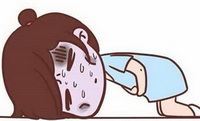
✵The postpartum pain in the lower abdomen is a case of pain in the lower abdomen occurring following childbirth, due to various pathogenic reasons.
✧ In the TCM system, the pathogenic reasons for the postpartum pain in the lower abdomen normally are deficiency in the middle after childbirth, affected by cold pathogen and drink cold water or take a cold diet, or with blood clots.
✵Ancient herbalists who hold a syndrome differentiation viewpoint with similar explain of pathogenic reasons, and the relevant representative work are introduced and quoted:"After childbirth, a woman suffers from deficiency in the middle, affected by the cold pathogen or drink cold water, the cold pathogen attack downward to the lower abdomen and pains, or there are cases pains in the lower abdomen due to blood clots, or there are cases pain below the belly button due to blood deficiency." [04].
"Case after childbirth, a woman suffers from a deficiency in the middle, affected by the cold pathogen or drink cold water, pains in the lower abdomen;
Case after childbirth, a woman suffers from pains in the lower abdomen due to blood clots;
Case after childbirth, a woman suffers from pain below the belly button due to blood deficiency." [04]."Pain in the lower abdomen: a woman suffers from pain in the lower abdomen, due to cold hurt the collaterals of the uterus, combat with blood and Qi, accumulated in the lower abdomen, triggered by deficiency, as a result, pains." [06].Different types of pain in the lower abdomen are introduced:
⑴.A woman suffers from pain in the lower abdomen, in the condition of Qi stasis and blood clotting;
⑵...., in the condition of the liver meridian blood is deficient;
⑶...., in the condition of dampness heat of the liver;
⑷...., in the condition Qi deficiency of the liver and spleen;
⑸...., in the condition deficiency cold of the liver and spleen;"A woman gave birth in winter months, as a result, cold pathogen invading the abdomen, distension and pain below the belly button, could not bear massage with hand...; Or in the condition, Qi is excessive and severe cold..." [08].
"A woman suffers from pain in the lower abdomen, ...residue blood not passing completely after childbirth, leading to a pain syndrome. Its symptoms are stabbing pain irregularly,...relieved sooner or later." [09].
"Pain in the lower abdomen after childbirth: in case of blood clots not passing down completely, is known as Er Zhen Tong(pain in the uterus)..." [10].
- Postpartum concretions and gatherings.
-

✵The postpartum concretions and gatherings is a case of concretions and gatherings occurring following childbirth, due to various pathogenic reasons.
✧ In the TCM system, the pathogenic reasons for the postpartum concretions and gatherings normally are improper diet(dietary irregularities, eating and drinking without temperance), cold and heat out of tune, lead to Qi concretions in the five Zang-viscera and Qi gatherings in the six Fu-viscera. The concretions, pain stay at one region; gatherings, pain does not stay at one region, because concretions are formed by Yin Qi, the Yin is sunken, gatherings are formed by Yang Qi, the Yang is floating. The Qi and blood hurt the Zang-viscera and Fu-viscera, weakness of Zang and Fu, affected by wind and cold pathogen, combat with Zang and Fu, binding with Qi and blood, thus formed concretions and gatherings in mass.
✵Ancient herbalists who hold a syndrome differentiation viewpoint with similar explain of pathogenic reasons, and the relevant representative work are introduced and quoted:"Xuan Pi Zhu Qi(hypochondrium or abdominal mass): a woman suffers from Xuan Pi(hypochondrium and abdominal mass), pathogens accumulated due to primordial Qi. In general, the syndrome of Xuan(hypochondrium), affect the right and left regions in the abdomen and close to the belly button, symptoms are a pain in muscles and collaterals, the shape is similar to arms or fingers or strings; the syndrome of Pi(abdominal mass), inside the ribs, pains sometimes. All due to the disorder of Yin and Yang, stagnancy in meridian and collaterals, the stagnancy of diet and drink, condense of cold Qi. Disorder of seven emotions, deficiency of Zang and Fu viscera, the disorder of Qi and blood, hurt of Yin collaterals, the disorder of circulation... Its size is similar to an egg in the initial stage, gradually grows big with size about four Cun..." [06].Common different types are introduced:
⑴.A woman suffers from hypochondrium or an abdominal mass, menstruation is stopped, emaciation and maransis, sores grow on cheeks or aside of teeth, the pulse is large rapid, and feeble, is the syndrome due to depression binding of the liver and spleen;
⑵.A woman suffers from hypochondrium or an abdominal mass, internal heat or alternative fever and chills, obstruction in chest and diaphragm, tastelessness in diet and drink, emaciated gradually;
⑶.A woman suffers from hypochondrium or an abdominal mass, pain in the abdomen when menses comes;
✵The postpartum concretions and gatherings other types are known including:
✧⑴.A woman suffers from concretions and gatherings after childbirth, residue blood not dissipating, form mass and pains.
✧⑵...., accumulation of residue blood, and no dispersion, accumulated into a mass; or alternating of cold and heat, no appetite(no food intake).
✧⑶...., accumulation of residue blood and Qi, and no dispersion, form a mass, flow upward and attack the heart and abdomen; or lead to cold and heat, emaciation in limbs, vexing pain, no appetite(no food intake).
- Postpartum pain of blood clots.
-

✵The postpartum pain of blood clots is the pain occurring following childbirth, due to residue blood clots, strains during childbirth, cold pathogen accumulation, etc. It is also known as Chan Hou Xue Kuai Zuo Tong(pains from residue blood clots after childbirth), also known as Er Zhen Tong(baby pillow pain), it is known as a separate syndrome, or sometimes it is also classified as one type syndrome of hematic abdominal mass introduced above in entry "Postpartum hematic abdominal mass(postpartum blood conglomeration)".
✵Ancient herbalists who hold a syndrome differentiation viewpoint with similar explain of pathogenic reasons, and the relevant representative work are introduced and quoted:"A woman suffers from pains from residue blood clots, most cases are due to dystocia and overstrain. Or due to improper care measure after childbirth or cold pathogen accumulation, as a result, blood stagnancy and pains..." [08].
"A woman suffers from pains from residue blood clots, move up or down, unbearable pain, due to blood accumulation before childbirth, Qi deficiency after childbirth, lochia not passing completely(lochiorrhagia), new blood and old blood combat and pains, normally known as Er Zhen Tong(baby pillow pain), is a kind of syndrome belongs to Xue Jia(hematic abdominal mass)..." [09].
- Postpartum hematic abdominal mass(postpartum blood conglomeration).
-

✵The postpartum hematic abdominal mass is a case of hematic abdominal mass occurring following childbirth, due to various pathogenic reasons.
✧ In the TCM system, the pathogenic reasons for the postpartum hematic abdominal mass normally are combat of blood and Qi, form mass, the mass pains and is movable, old wind and cold pathogen, less uterine blood after childbirth, if not be treated urgently, accumulated and form mass, affect menstruation, obstacles in mild case or menses stop in serious cases.
✵The postpartum hematic abdominal mass common types are known including:
✧⑴.A woman suffers from hematic abdominal mass after childbirth, persistent flow of lochia(lochiorrhea), form blood mass, sudden cold and fever, distention in the heart and abdomen, no appetite(no food intake), emaciation and thin in limbs, or dry mouth.
✧⑵...., Qi and blood are not in harmony, mass is formed in the abdomen, gathering and not dissipating.
✧⑶...., blood mass, pains and movable no fixed region.
✧⑷...., blood block and persistent flow of lochia(lochiorrhea) after childbirth, urgent after-pains, affected by concretion and pains, turn to emaciation gradually.
✧⑸...., deficiency of blood sea and Qi, pain in the abdomen and interior viscera, vexation, and depression in the chest, mass is formed less or more.
✵Ancient herbalists who hold a syndrome differentiation viewpoint with similar explain of pathogenic reasons, and the relevant representative work are introduced and quoted:"Case one to two days after childbirth, a woman suffers from mass in the lower abdomen and pains, is the condition pains due to uterus is hurt..." [02].
"A woman suffers from mass in the lower abdomen and pains after childbirth, what is it? It is the condition that the collaterals of the uterus are not broken..." [05].
- Pain and itching in genital regions.
-
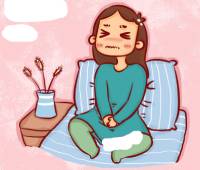
✵Woman pains and itching in genital regions is syndrome pains in genital regions, or pains and itching in genital regions, due to various pathogenic reasons.
✧ In the TCM system, except colpitis, parasitic disease, and other exogenous pathogenic reasons, the pathogenic reasons for pain and itching in genital regions normally are dampness in the liver meridian, heat pathogen affect the liver meridian, etc.
✵Ancient herbalists who hold a syndrome differentiation viewpoint with similar explain of pathogenic reasons, and the relevant representative work are introduced and quoted:"A woman suffers from pain and itching in genital regions, what is it? It is the condition of dampness and heat accumulation in the liver meridian." [05].
"A woman suffers from pain and itching in genital regions after childbirth, what is it? It is mainly a syndrome of dampness and heat, and other reasons are sitting on the cold ground or use cold water..." [05].
"A woman suffers from itching in genital regions, due to various reasons..." [06].Different types are introduced:
⑴.A woman suffers from itching in genital regions, discharge water regularly, poor appetite and lassitude, is the condition of liver spleen Qi deficiency, dampness and heat pathogens invasion of the lower energizer;
⑵.A woman suffers from itching and pain in the genital, internal heat and lassitude tiredness, poor appetite(do not take food or reduced appetite), is the condition of the liver spleen is hurt from depression anger, deficiency and hurt of the primordial Qi, dampness heat accumulation;
References:
-
- 01.Postpartum pain syndromes:an introduction of postpartum generalized pain, lumbago, cold hernia, distention and fullness of hypochondria, concretions and gatherings, and other related pain syndromes.
- 02.Song Shi Nǚ Ke Cuo Yao(the Synopsis of Song's Gynaecology).By 宋林皋(Sòng Lín Gāo)[Ming].
- 03.Nǚ Ke Cuo Yao(the Synopsis of Gynaecology).By 薛己(Xuē Jǐ)[Ming].
- 04.Jiēzhāi Gōng Tāi Chǎn Yī àn(Births Cases of Jie Zhai Gong).By 王纶(Wáng Guān)[Ming].
- 05.Fù Kē Bǎi Biàn(the Differentiations in Hundred Syndromes of Gynaecology).By 庄履严(Zhuāng Lǚyán)[Ming].
- 06.Nǚ Ke Bǎi Xiào Quán Shū(the Efficacious Complete Book of Gynaecology).By 龚居中(Gōng Jūzhōng)[Ming,1630].
- 07.Huang Shi Nǚ Ke(the Synopsis of Huang's Gynaecology).By 黄彦荣(Huáng Yànróng)[Ming,1504].
- 08.Ye Shi Nǚ Ke Zhèng Zhì(the Syndromes and Therapeutics of Ye's Gynaecology).By 叶桂(Yè Guì)[1817].
- 09.Fù Kē Bèi Kǎo(the References of Gynaecology).By 何应豫(Hé Yīngyù)[1820].
- 10.Fù Kē Liáng Fāng(the Effective Prescription of Gynecology).By 何梦瑶(Hé Mèngyáo)[1751].
